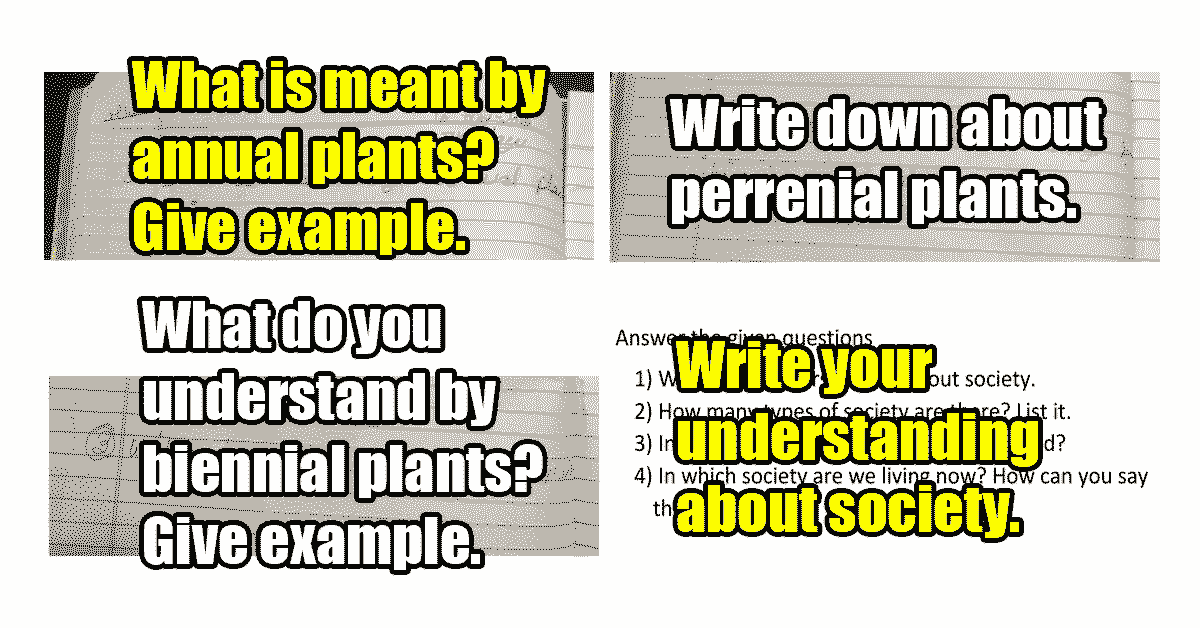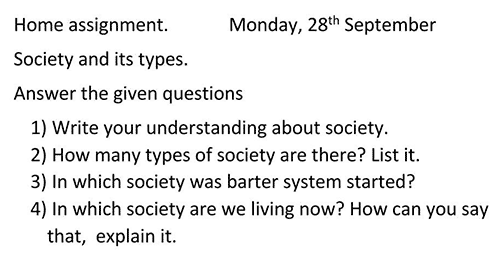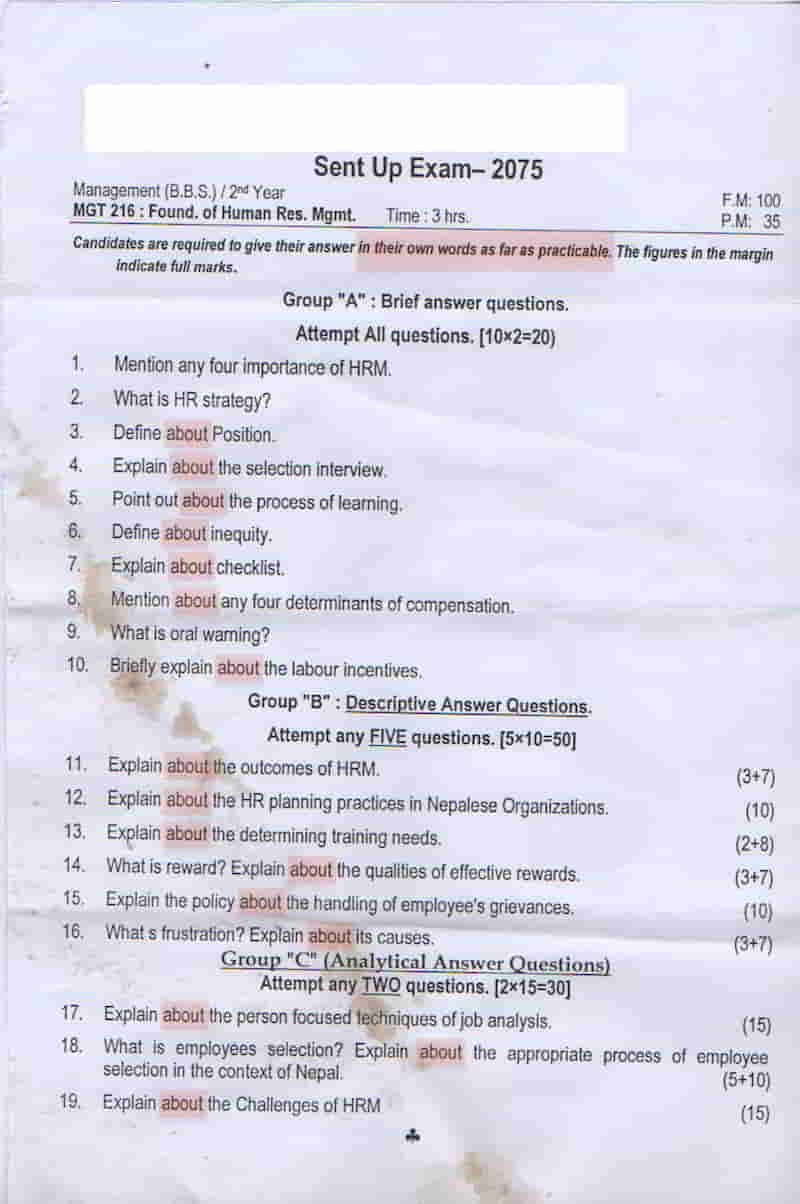
English, being what it is, not surprisingly, has its own flavor in different parts of the world. English in Nepal is no different. Let’s call it Nepanglish. Unfortunately, apart from colloquial Nepanglish having some peculiar characteristics, academic English in Nepal has also veered away significantly from English English!
Nepanglish used by many instructors, administrators, examination boards, appearing in many textbooks, as far as I am concerned, is a meta-morphed little beast of English. When taught to children as — and being passed for — English, aspects of academic Nepanglish beast inflicts a lot of harm.
I shall be focusing on just one aspect of Nepanglish: wording of questions student get. These three questions come from my nephew’s third-grade science homework notebook.
1. What is meant by annual plants? Give example.
2. What do you understand by biennial plants? Give example.
3. Write down about perennial plants. [Emphases mine.]
(If you followed the link to the notebook in the image above, you will have noticed some spelling mistakes too. Please ignore them. Obviously, it’s difficult to ascertain if they were the teacher’s or my nephew’s.)
In my first career as an international science teacher, I NEVER used such wordings nor did I EVER see such wordings in textbooks nor did I EVER see them in the external examinations my students sat for.
Let’s look at the second question. Were I grading the homework, I would have marked as correct anything that the student wrote in response. (If this had been a test, I would have given full credit to ANY and EVERY answer the students provide in response.) Obviously, because the question is asking the student to provide his/her understanding of the term!
But I am pretty sure neither my nephew’s teacher nor ANY Nepali teacher would have done that. The reason? This is Nepanglish. What the question is REALLY asking, in plain English, is this: “Define biennial plants.” In other words, students in Nepal have to memorize the English denotation of Nepanglish words and/or phrases (such as “What is meant by…” or “what do you understand by…” or “Write down…”) and provide the answers accordingly — i.e. the answers they have been taught to memorize.
The following is also homework my little nephew got — last month, as a fourth grader, from a different teacher. Apart from the fact that the first question is about “understanding,” all the questions are, as you can see, full of mistakes and/or convoluted…and, again, this is Nepanglish.

The ones who are ultimately responsible for these wordings are the members of the examination boards. Either their command of English is very poor or they didn’t care sufficiently to not make mistakes such as these. The teachers — like my little nephew’s primary school teachers and other — who are ultimately preparing students for national level examinations, teach, not surprisingly, what they have learned or are required to teach — Nepanglish!
I have seen the phrases “What do you mean by…” and “What is your understanding of…” etc. in grades 9 and 10 examination papers. I have seen them in what appears to be the notebook of either a sixth former (grade 11-12 student) or undergraduate student. Another question that’s popular is “Write short notes on…” which I saw a lot of in a Grade 11-12 Chemistry guide book.
And, finally, the following (see image below) appears to be an undergraduate examination paper in Business Studies. The English, again being Nepanglish, is way off. They look like horrible translations of questions originally set in Nepali. Apart from the ubiquitousness of the word “about”, many of these questions don’t make any sense! And yet, thousands of students would have attempted them…dutifully reproducing answers they had committed to memory!
Did the questions make sense to you?
GENERALLY, when the proper and precise meaning of a term or concept are NOT taught and driven home, students are forced to memorize their meaning. Consequently, when such a term appear as part of a question in an assessment or as a key term in a topic or as a central concept of a subject — for example investigations in Science — or even as part of a discourse, they demonstrate an incomplete understanding of the term. And when that extends to most or all of the key terms and concepts associated with a topic (or subject), they demonstrate, at best, an incomplete understanding of the topic or subject. For obvious reasons, of course — terms and concepts underpin topics and subjects!
Worse still, when Nepali children have to learn made-up Nepanglish meanings of actual English words, what choice do children have other than to just memorize whole sequence of sentences and paragraphs, and regurgitate them in homework, tests, and examinations?! It is no surprise then that only a minority of products of Nepali education system have a very good command of English.
Furthermore, contrary to the impression you might have gotten from the phrase “What is your understanding of…”, it’s rare for teachers or examiners (or parents) to REALLY ask that of children. Nepali adults don’t ask children what they are thinking or feeling even in real life. Forget about asking that in a test or an examination.
Another detrimental consequence of all that is how Nepalis — whether children or adults — handle questions. Having been taught WHAT to think as opposed to HOW to think, when asked a question, a Nepali will “go fishing” for the “correct” answer in their head. Naturally, because of the duration and frequency of that conditioning. What should happen instead, of course, is for them to FORMULATE an answer using their knowledge and understanding of the concepts/processes associated with the subject matter.
And educating children HOW to think — and therefore formulate their own answers to questions etc. — is NOT rocket science!
As a science teacher, keenly aware that teaching science is kind of like teaching a new language, I made teaching the language of Science an important component of my my science education program. Vocabulary is crucial in learning and mastering a language. Learning and doing science, science literacy, is no different.
Introducing a topic in Science, for example, was all about making sure that they were aware of the meaning(s) of the most important terms and concepts associated with the topic. The meanings of the key terms and concepts, of course, would be reinforced again and again so as to ensure they understood and mastered their meanings. The video below is an example of just that. It’s an introduction to the meaning of the word “Bond” in preparation for the topic of Bonding in Chemistry.
(Of course, the presentation was accompanied by a live narration from me which is missing. But if you watch closely, you’ll get a sense for what I am doing here…in addition to eliciting some laughter in you…which is also an important component of teaching!)
Additionally, this page from a Science Student handbook for 7-8 graders we handed out to students is about how to answer questions in Science. And this page lists common key words they are likely to encounter in science investigations and questions, what they mean, and, therefore, what is expected in response. Those key words appeared in the question I formulated for my students. Those key words are used by examiners formulating examination questions for my students as well as students all over the world!
Of course, the meanings of those key words and our — science teachers’ — expectations are indeed THE meanings and expectations of everyone around the world! Plus, we — the science teachers — reinforce them over the course the rest of the students’ secondary and high school years and further! And so, when they complete their education, they will have mastered the meanings of such those key words, and will have a very good understanding of what is expected when confronted with questions containing them, for example.
…Except in Nepal…where Nepalis graduating with degrees will have mastered Nepanglish! 🙁 🙁
If English words or terms or concepts do not denote what they actually mean, and if you are expected to do something completely different from what the words are asking you to do, of course, there’s bound to be students who likely get pretty confused and lost. There’s also bound to be students who actually know and understand the denotations of such terms and can — and do — demonstrate that. But, they likely lose out in this system — they could be labeled as being “wrong” — even while actually doing better in real life and in real terms. That’s partly why, for example, most Nepali students refrain from correcting teachers (or parents or adults in general)!
Over the last couple of decades, children — even many in Nepal I am sure — have been living in a highly connected world. They have access to — and learn from — a wide range of sources. As such, to many Nepali children, most Nepali teachers and administrators — because they are very traditional — likely appear to be relics of an old past in the way they do things and in the expectations they have etc.! I am sure many children have left their teachers far behind but the teachers have NO clue!
But, to reiterate, teachers do NOT have to remain clueless. Teaching children HOW to think is NOT that difficult, as I am sure you saw from the video above and the images of pages from the Science Handbook. My students weren’t all native English speakers and they learned! Heck, I am NOT a native English speaker and I TEACH this stuff!!
And finally, a question for you: “What do you understand by Nepanglish now?”
Never mind…whatever it is, even after all that, I am pretty sure it’ll be wrong…if you know what I mean! 😉 😉 😉
What do you think?

